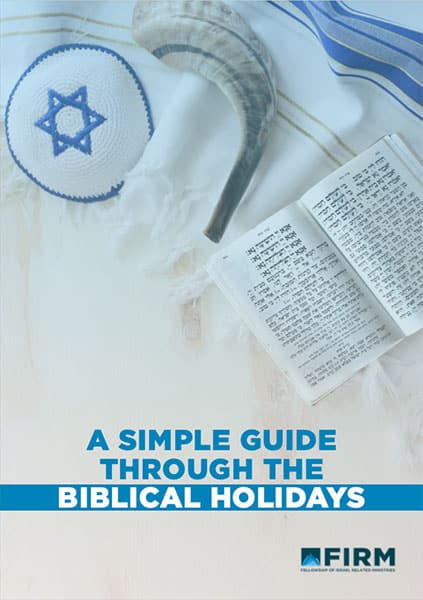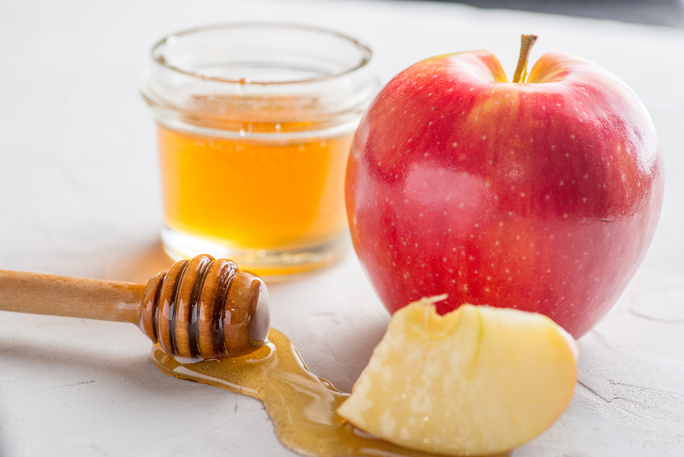If you ever wondered how Rosh HaShanah is celebrated in Israel, you came to the right place.
We asked a couple of FIRM local ministry partners to share how they observe this special holiday. They are Israeli and just like their Jewish neighbors they celebrate the Feasts of the Lord that we know from the Bible.
How is Rosh HaShanah Celebrated in Israel?
Jonathan Arnold grew up on a kibbutz in Israel. He came to faith in Yeshua in 2002, and ever since has been serving the Lord in various areas of ministry. Jonathan is one of the pastors at Kerem-El Congregation in Haifa, and an adjunct teacher at Israel College of the Bible. His passion is teaching the Word of God and caring for the congregation. Jonathan shared:
I have some vivid memories from my childhood at a kibbutz. I can still remember the kibbutz dining hall filled with people. The place was decorated and most of us wore white – it was our way to celebrate and enter the New Year.
Symbols of Rosh HaShanah
On every table you’d find apples and honey, representing a blessed and sweet year. Another great symbol of Rosh HaShanah on the tables were the pomegranates. We’d find them both whole – as decoration – as well as already “opened” ones, to snack on the juicy and sweet seeds.
In Israel, we say there are 613 seeds in an average pomegranate. According to some Jewish scholars, this is the number of commandments. Thus, having the pomegranate seeds at the celebration of Rosh HaShanah expresses the desire to lead obedient, righteous lives before God.
There were many foods that are symbols celebrating and expressing blessings. Another one was a fish head! Aside from all the fruit and sweet elements, you’d find fish – sometimes a while one, and sometimes just the head. It also represents blessing: to be the head and not the tail. The head of the fish is a symbol of success.
The Sound of a New Year coming
Every year at Rosh HaShanah in Israel we sing many songs, and it is always a very joyful time. But the songs are not the most important sound of the day. Every year the sound we look forward to the most is the blast of the shofars. At the kibbutz, during the event, there was always at least one person with a shofar – but usually more!
As children, we were always very excited for this sound! Rosh HaShanah became this great, big feast over the years, possibly because of the agricultural calendar. But biblically, this holy day is not called the new year, but instead Yom Teruah – the Feast of Trumpets!
Blowing the trumpet is in fact the only unique thing that the Bible says about this day. You will blast the shofars and it will be a holy day of rest – that’s the Biblical command. The Bible has a lot more instructions for other holy days, but on Yom Teruah you’re only commanded to blow the shofar.
The shofar was used all through the Old Testament, and its prophetic significance is stressed even more in the New. The sound of the shofar will announce the second coming of the Messiah.
Congregations in present-day Israel
With our community of believers, we celebrate Rosh HaShanah in a similar fashion to other Israelis. We prepare apples and honey for our gatherings and wish everyone a sweet new year. But more importantly, we remind everyone of the theme of trumpets. Because truly, it is a theme that is prevalent from Genesis to Revelation.
At every holiday, we emphasize how every day set apart by God relates to Yeshua. With Passover being fulfilled on the Cross, and the Holy Spirit being poured out on Shavuot, Yom Teruah announces what is to come: the return of the King.
Something special that we do every year is we prepare a gift for every member of the congregation. We would often print a Bible Reading Plan for the upcoming year, with a blessing and a prayer on the cover page. Sometimes instead of a reading plan, we gift everyone with a devotional book. We want to bless everyone with something that will encourage them in their faith.
A Time for Togetherness
Rosh HaShanah in Israel starts a season of biblical holidays when families and friends gather together. Even if you are not married or don’t have children of your own, this is a time of fellowship.
We encourage members of our congregation to also invite visitors to their homes, so that no one feels alone. During the pandemic, this season has been difficult. Since early 2020, every feast has been very different from what we’re used to.
But we try to be creative with sharing love and care with our community. Last year we were not able to gather, so with the right precautions we hand-delivered gifts to everyone. This year we are postponing some of our celebrations. But we already look forward to being together again after the restrictions are lifted.
How is Rosh HaShanah Celebrated in Jerusalem?
Sandy Shoshani is the Director of Be’ad Chaim, Israel Pro-Life organization, and is an advocate for the unborn. She made Aliyah (immigrated) to Israel in 1979 and is married to Pastor Oded Shoshani. They have seven children, and the number of their grandchildren keeps growing! Sandy shared with FIRM what Rosh HaShanah meant to her and her family in Israel:
Our family always gets together for a festive meal on the eve of Rosh HaShanah, and sometimes we are even more than 30 people! Oded and I have seven children and all of them are married with children now. Together with their families, our holiday celebrations can get quite crowded.
Tradition with Priestly Roots
We have a pomegranate tree in our garden, and we’ve been enjoying its fruit every year. This year, it seems especially abundant! We take it as a very encouraging sign, a gift from the Lord. The pomegranate fruit is very priestly. Israelites attached it to the priestly robes (Exodus 39:24-26) for service and included it in Temple design. In combination with the fruit’s crown, it can be seen as a symbol for a servant king.
Apart from pomegranate, we fill our tables with apples, dates, grapes and honey. This is the time to be thankful, and we enjoy as a family coming before the Lord to thank Him for His blessings over the course of the year.
Before I came to know Yeshua (Jesus), my family went to the synagogue on Rosh HaShanah, but I didn’t see gratitude there. It felt like we were following many regulations.
Today, gathering around the table with our loved ones feels a lot more spiritual. We take this time to look back at what God brought us through, and we look ahead to what He has for us.
Rosh HaShanah According to the Bible
Feasts are ordained in the Bible, and it is our honor and joy to observe them in a way that God commanded. But we remember that this time is all about His love and not just rules. We celebrate the freedom from sin we’ve been given in the Messiah Yeshua.
Biblically, this is the Feast of Trumpets, and there is no mention of a new year at this time of the year in the Bible. Every morning in Jerusalem we hear the sound of the shofar, blasting from different households and synagogues. The Jewish people blow the shofars regularly in this season, just as we are commanded (Leviticus 23:24).
Our hope is to hear the shofar calling that the Lord is near. It is a sound of victory, and it announces the king. The sound of the shofar makes me think of victory, which we attain not by fighting but raising our voices to the Lord. But the shofar is also a signal to be prepared.
On Rosh HaShanah, the blast of the shofar readies us for Yom Kippur – the Day of Atonement.
Stay tuned for more personal stories about celebrating Biblical holidays in the Land of Israel. Next week another two FIRM local partners will share about their experiences observing the Day of Atonement.
We are so grateful for the Body of Believers in Israel. We are learning a lot from FIRM’s local partners – and it is our joy to share it with you, too!

A Simple Guide Through the Biblical Holidays: Free PDF Download
You may know them as the “Jewish holidays,” but did you know the Bible calls them “Feasts of the LORD”?
We’ve put this guide together for you so that you have all you need to know about these holidays that God calls His own.
Articles Related to Rosh HaShanah
Estimated reading time: 7 minutes

